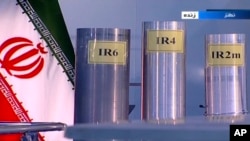Iran has substantially increased its stockpile of uranium enriched to near weapons-grade levels in recent months, multiple media outlets cited a report from the International Atomic Energy Agency (IAEA) as saying, likely raising further doubts about a potential deal with the United States on Tehran's nuclear program.
Israel reacted swiftly, with Prime Minister Benjamin Netanyahu's office saying the UN nuclear watchdog's confidential May 31 report showed that Iran is pursuing nuclear weapons.
Tehran, meanwhile, rejected the report, calling it "politically motivated" and saying it will take "appropriate measures" in response to any attempts to take action against the country, without being specific.
The agency report said Iran had amassed 408.6 kilograms of uranium enriched up to 60 percent as of May 17, up from just under 275 kilograms in the IAEA's most recent report, in February, according to the Associated Press.
It's a "short, technical step" from 60 percent to weapons-grade levels of 90 percent, AP reported. It cited the IAEA as saying about 42 kilograms of 60 percent enriched uranium is theoretically enough to produce one atomic bomb if enriched further to 90 percent.
The IAEA report said Iran is now "the only non-nuclear-weapon state to produce such material," which it said was of "serious concern."
It comes as US President Donald Trump has been seeking to forge a deal with Iran to rein in its nuclear activities.
Washington and Tehran have held five rounds of talks since Trump, who withdrew the United States from a 2015 international deal with Iran during his first term and reimposed sanctions, returned to office in January of this year.
Uranium enrichment has been a major sticking point. The US administration maintains Iran must cease all enrichment activities, and Iran has rejected that demand.
Iranian Foreign Minister Abbas Araqchi, who leads Tehran's negotiating team in the talks, on May 31 said he had received "elements" of a US proposal for a potential deal following the Omani-mediated talks.
Araqchi wrote on social media that Omani counterpart Badr al-Busaidi "paid a short visit to Tehran today to present elements of a US proposal which will be appropriately responded to in line with the principles, national interests, and rights of the people of Iran."
Senior Iranian officials said on May 29 that any deal must include the removal of sanctions against Tehran and must allow its nuclear program -- which it insists is peaceful -- to continue.
Still, Trump said on the following day that he believes an agreement could be reached in the "not too distant future," adding Iran "would rather make a deal" than "be blown up" -- a reference to his repeated warnings that Tehran could face major military consequences if it does not conclude a nuclear pact.
On May 28, Trump said he had told Netanyahu to hold off on striking Iran to give the US administration more time to push for a new nuclear deal with Tehran.
Shortly after news of the IAEA report emerged, Netanyahu's office said the level of uranium enrichment Iran had reached "exists only in countries actively pursuing nuclear weapons and has no civilian justification whatsoever."
The report "strongly reinforces what Israel has been saying for years -- the purpose of Iran's nuclear program is not peaceful," it said in a statement, adding: "The international community must act now to stop Iran."
A separate, in-depth IAEA report, which was also confidential and also seen by media outlets, lamented what it said was "less than satisfactory" cooperation from Iran over traces of uranium found by IAEA inspectors at multiple locations that Tehran has not declared to be nuclear sites.
Grossi reiterated his "urgent call upon Iran to cooperate full and effectively" with the ongoing IAEA investigation involving those sites. According to AP, "Western officials suspect that the uranium traces discovered by the IAEA could provide evidence that Iran had a secret military nuclear program until 2003."









